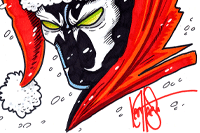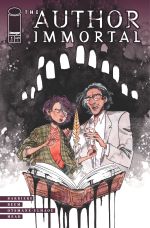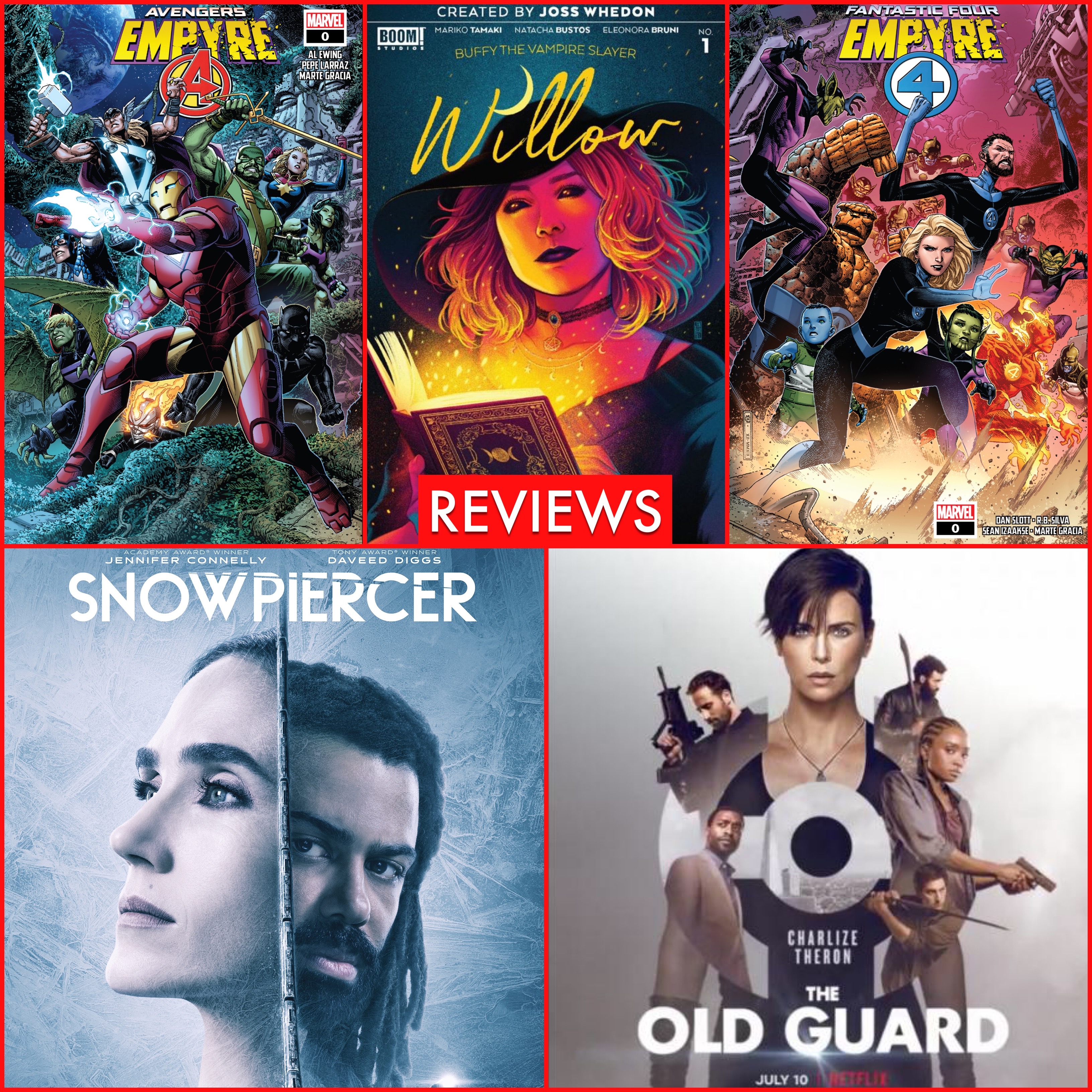|
 |
Waiting
For Tommy
By Richard Johnston
If you're
thirteen, reading comics, and Chris
Claremont's X-Men
isn't the best work of graphic fiction in the world, there's
something wrong with you. Afterwards, that's debatable. But
Chris has held onto a fair chunk of his audience and years
after he made his name with the X-Men, he's ploughing his
own trough on X-Treme X-Men, returning to the franchise after
significant work for DC,
Wildstorm, Broadway and more. Indeed his most prominent DC
work, Sovereign Seven is reported to have had the most generous
creator-owned contract in DC's publishing history.
And my wife, currently ploughing through
Essential X-Men Vol 4 also asked me to offer her thanks. She's
just discovered comics, and it's the Chris Claremont X-Men
that has sucked her in. Sandman, Strangers In Paradise, Bone,
Preacher, nope. Which meant *she* was able to point out bits
in the second movie to me. "Is that Mastermind or Proteus?"
"Look, that's the Phoenix".
This was very annoying. I intend to get my own back with American
Splendor.
Chris is a busy man these days (as tracking
down these answers proved) but he found some time to answer...
indeed in one case, to give an answer of Bryan Hitch length
proportions [ED Note: check out that interview here].
Ladies and Gentlemen, the X-Gene himself, Chris Claremont.
RICHARD
JOHNSTON: You're the main reason the X-Men franchise is
the success it's become. You've nurtured and grown it - with
the help of others, but you've been the mainstay on the book.
And you currently write one of Marvel's best selling books,
Xtreme X-Men. But it seems like the book's been pushed to
the sidelines, your attention drawing artist Salvador Larroca
pulled off (initially) against his will, and promotion is
low. Yet you regularly bring in 70-80,000 readers for Marvel
a month. Do you feel appreciated?
CHRIS
CLAREMONT: Well, there's always room for improvement.
RICHARD:
Alright, alright, is there anything in the argument that X-Treme
X-Men is a sop handed to you by a corporation who want to
exploit what you created for them at the hands of others,
but without the support you might need?
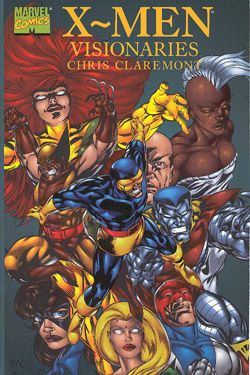
X-MEN
VISIONARIES TPB |
CHRIS:
I suspect the answer depends largely on one's perspective.
Some people feel that's so; others don't. From Marvel's
stand-point, and a business perspective, this has clearly
turned out to be a win-win situation. They gain the benefit
of what they have presented to the marketplace, and what
the marketplace has accepted, as a revitalized, re-imagined
Canon, chock-a-block with new creative staff, new ideas,
radical concepts and the like. At the same time however
they also produce a title which continues the through-line
of character and Canonical history (and here I draw a
major distinction between history and continuity, there
is a difference) that goes directly back to Stan and Jack. |
It's like
producing "New Coke" and "Classic Coke", and having both be
hugely successful. In Marvel's case, their primary X-related
publishing program runs the gamut from Ultimate
X-Men, through New and Uncanny to X-treme. In this way,
they not only get the full roster of "A"-list characters front-and-center
to the audience every month, they do so across a breadth of
styles and directions that allow them to maximize their potential
audience. If you don't like one particular style, one of the
other books might provide an alternative. If you enjoy them
all, so much the better. Either way, Marvel benefits.
From
my own perspective, the responsibility remains the same, to
produce work that has both creative and commercial value,
that's worth the effort I take to write it and which provides
satisfaction and enjoyment to the readers.
RICHARD:
Okay, Chris, you have the floor. You're known for your continuity/history,
specifically in the X-Men. I remember the X-Men Plot Dangler
on the Internet -- which kept a running list of your yet-to-be-resolved
subplots, set-ups, dangling storylines -- as it grew and grew.
What do you see as the difference between continuity and history,
what's the importance of that difference in your work as you
see it, has it always been that was and finally, what exactly
was Mister Sinister's plan involving the Summers family?
CHRIS:
In practical terms, history is the Canon - the stories - going
back to the first issue of a series. Continuity should be
for us what it is in film and TV, a matter of making sure
the look and behaviour of each issue is consistent. In equally
practical terms, both definitions are fungible, subject to
the determination of the editors and the policy of the publisher.
As far as Sinister's plan, I think it was a lot more fun that
anything I've seen about him since. But that's just my opinion.
RICHARD:
Well, let's take one recent example. You killed off the character
Psylocke fully expecting to be able to revive her. Joe
Quesada's policy of no resurrections soon put pay to that.
Is there any truth in the rumour, you're bringing back Betsy
Braddock through some loophole?
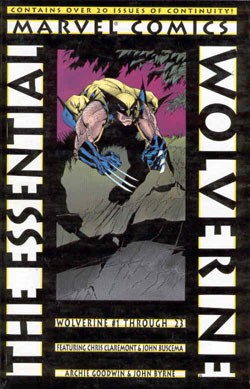
ESSENTIAL WOLVERINE VOLUME I TPB |
CHIRS:
I'm the writer. That means traditionally, I'm always
the last to know.
RICHARD:
I am hearing more and more of that of late. Nevertheless,
X-Treme X-Men pushes on, despite the way it's perceived
to be treated by Marvel. Why do you believe X-Treme
X-Men survived and X-Men: Hidden Years did not, both
being products of the creators who produced what's considered
the 'essential' X-Men stories? CHRIS: I don't
know. I enjoyed Hidden Years quite a lot and was sorry
to see it cancelled. I've been a fan of John's work
since I first saw Rog-2000 and working with him will
always be one of the hallmarks of my career. |
The stories
and series he's handled since we split up have always been
on my "must-read" list, partly because he is superb at both
story-telling and characterization but in large measure (for
me) because of the breadth of his visual imagination. I keep
hoping to see things I haven't seen before, creatures, cultures,
spectacle, and over the course of years have rarely been disappointed.
The most frustrating thing with John is that, invariably,
the more I see, the hungrier I am for more.
RICHARD:
You've been accused by John of lacking a filter - every idea
that comes your way, even if treated as a joke, ends up in
your books. What ideas have you rejected in your time?
CHRIS:
John's probably right. I always figured that's what editors
were for, to help filter out the dross. As for what I've rejected
- well, it's an old writer's axiom that nothing's ever truly
rejected. You simply file it away for future reference. Sooner
or later, given half a chance (and even after being morphed
totally beyond recognition), everything gets used.
Page:
1 | 2
Continued Here |
 |

